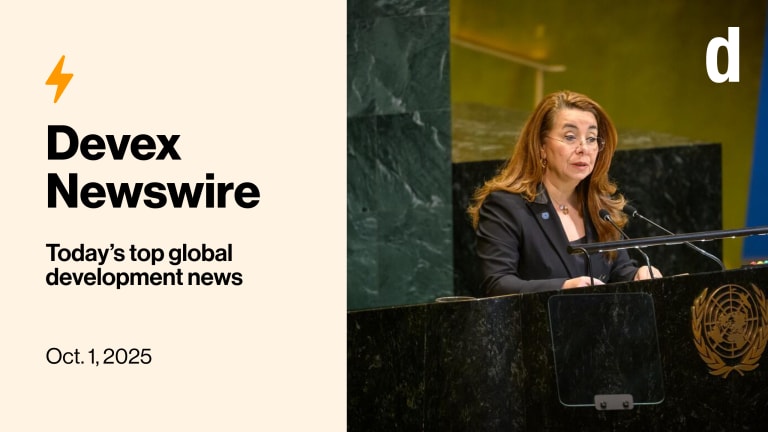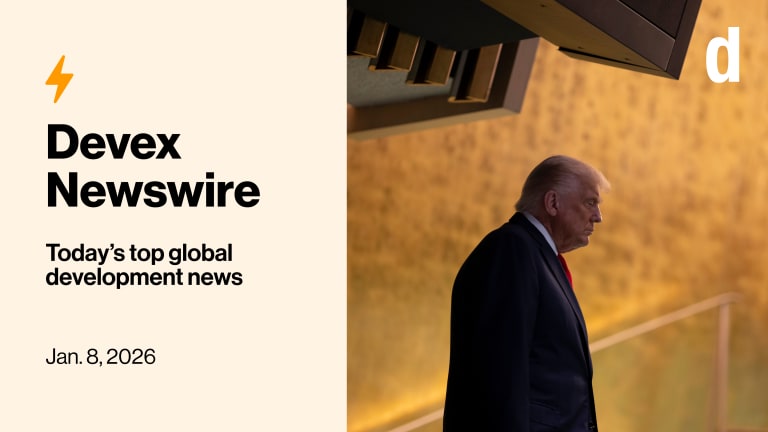
Today, Devex Pro Week continues with an in-depth examination of the current state of the United Nations. Under pressure from U.S. funding cuts, Secretary-General António Guterres is rolling out sweeping reforms through the UN80 Initiative. China, now the organization’s second-largest financial contributor, is pressing for more jobs and influence as Washington retreats.
Also in today’s edition: The Trump administration asks the Supreme Court to wade into the foreign aid battle.
+ Happening tomorrow: We’ll round off Pro Week tomorrow at noon ET with a conversation on building tomorrow’s INGOs with a panel of some of the sector’s new power players. They’ll explore building new business models and sustainable revenue streams, keying into the digital transformation, and keeping ahead of the shifting power and political dynamics. Register now and submit your questions in advance.
Crouching tiger, hidden panda
The United Nations is bracing for sweeping change. Facing massive U.S. funding cuts, it has floated slashing 20% of its secretariat’s 33,000-strong workforce. And China — now the U.N.’s second-largest contributor — isn’t shy about seizing the opening. Chinese diplomats have pressed for more jobs for their nationals and even argued American staff should bear the brunt of any layoffs.
In Washington, alarm bells are ringing, writes Senior Global Reporter Colum Lynch. Sen. Jeanne Shaheen warns that President Donald Trump’s cuts give Beijing a chance to “fill the political vacuum.” “China will be writing the rules,” she says. Trump’s pick for U.N. ambassador, Mike Waltz, promises to “work with Secretary [of State Marco] Rubio to challenge [China’s] influence.”
China’s financial share in the U.N. has surged from less than 1% in 1995 to over 20% of the regular budget today, with Beijing aggressively promoting its people into entry-level U.N. jobs and steadily moving into senior posts. Richard Gowan of the International Crisis Group puts it bluntly: “[The Chinese] are straightforward about the fact that, if the U.S. fails to pay its assessed contributions, China should be getting an even bigger share of top jobs.”
But analysts say Beijing isn’t trying to replace Washington outright — it’s picking its battles, taking influential but low-profile posts while pledging money where it counts, like $500 million to the World Health Organization after U.S. withdrawal.
“The U.S. departure creates an opportunity for Beijing, but the question is whether Beijing wants to fill that gap,” says Courtney Fung of Macquarie University.
Read: China ramps up push for more UN jobs (Pro)
+ This piece is part of our Devex Pro Week offering. So far, we have produced deep-dive articles, events and conversations, and special reports on the impact of a turbulent 2025 on philanthropy, the United Nations, MDBs, and bilateral donors. Tomorrow, we’ll conclude with INGOs.
Not yet a Pro member? Our offer of $100 off an annual membership is still on. Take advantage of it today and enjoy our full Pro Week lineup as well as all our premium content for a whole year.
W-80 decision
The U.N. is rolling out the UN80 Initiative, a sweeping reform package meant to mark its 80th anniversary — and, unofficially, to convince the Trump administration not to slash funding even further.
Launched in March by Guterres and led by U.N. Undersecretary-General for Policy Guy Ryder, UN80 boils down to three main prongs: belt-tightening in the secretariat, reviewing the 40,000 mandates handed down since 1945, and possible mergers across U.N. agencies with overlapping roles.
Behind it all is a brutal money crunch, writes Colum. Washington owes the U.N. more than $1.7 billion, mostly in unpaid peacekeeping dues. But “this is not simply a cost-cutting, downsizing effort,” Ryder insists. “The objective is to make the U.N. better.”
Critics aren’t buying it. “Basically, [the current funding crisis is] because the U.S. stopped paying,” says Ian Richards, head of the U.N. staff union in Geneva. Meanwhile, Stewart Patrick of the Carnegie Endowment for International Peace calls it “a slash-and-burn approach,” adding, “they are basically unwittingly replicating a DOGE experiment at the United Nations.”
Trump’s team, meanwhile, is claiming victory. At his confirmation hearing, U.N. ambassador nominee Mike Waltz said, “I do not think Secretary General Guterres would have his UN80 plan already on the table if he didn’t take President Trump very seriously.”
But U.N. staff, experts, and many member states remain unconvinced. To them, UN80 looks less like smart reform and more like a scramble to appease Washington — with no guarantee the U.S. will stick around to reward it.
Read: UN80 and the incredible shrinking United Nations (Pro)
Raving review
After Trump lashed out on social media platform Truth Social, accusing billionaire philanthropist and Open Society Foundations founder George Soros and his “wonderful Radical Left son” of supporting “Violent Protests” and calling them “lunatics” and “psychopaths,” OSF issued a defense.
“These accusations are outrageous and false. The Open Society Foundations do not support or fund violent protests. Our mission is to advance human rights, justice, and democratic principles at home and around the world,” the group says, adding: “We stand for fundamental freedoms guaranteed by the Constitution, including the rights to free speech and peaceful protest that are hallmarks of any vibrant democracy.”
Order in the court
The Trump administration has asked the Supreme Court to weigh in on the largest legal battle related to foreign aid — stating that without the court’s intervention, the administration would be forced “to rapidly obligate” $12 billion in foreign assistance and “continue obligating tens of billions of dollars more.”
“That is textbook irreparable harm,” wrote the Department of Justice in an emergency filing, which was sent to the Supreme Court on Tuesday.
The filing added that those suing the government — both nonprofit organizations and for-profit contractors — “have no entitlement” to the funds, and “simply want to compete for foreign-aid awards.”
The move comes after a three-person appeals panel backed the Trump administration earlier this month, stating that a district judge’s injunction — which for months has required the U.S. government to pay its USAID partners — should be overturned.
Despite that, the full appeals court declined to put that ruling into effect, meaning the Trump administration was still required to distribute foreign aid funds that had already been congressionally approved. Now, the government is just four weeks away from the end of the fiscal year — and because of that deadline, the Department of Justice is asking the Supreme Court to take action on the case by Sept. 2.
“It is hard to imagine how respondents could suffer any irreparable financial harm, since they have no entitlement to receive the funds even if they remain available,” the filing stated.
Background: US appeals court backs Trump in fight over foreign aid freeze
+ Explore our regularly updated court tracker to catch up on the latest on the U.S. foreign aid docket.
Chaos at CDC
Susan Monarez is out as the U.S. Centers for Disease Control and Prevention director after just a month in the role. The Department of Health and Human Services, or HHS, which oversees the CDC, said Monarez “is no longer director … We thank her for her dedicated service,” adding that Health Secretary Robert F. Kennedy Jr. “has full confidence in his team at @CDCgov who will continue to be vigilant in protecting Americans against infectious diseases at home and abroad.”
The shake-up stunned staff, according to STAT. Her dismissal “comes as a shock to CDC employees,” one staffer said. Another called it “utter chaos.” Monarez’s brief tenure has included budget cuts, layoffs, a campus shooting, and turmoil over vaccine policy.
But just over an hour later, Monarez’s lawyers said she has “neither resigned nor received notification from the White House that she has been fired” and emphasized that “she will not resign.” Instead, her lawyers said she’s been targeted for refusing to “rubber-stamp unscientific reckless directives and fire dedicated health experts.”
“First it was independent advisory committees and career experts. Then it was the dismissal of seasoned scientists. Now, Secretary Kennedy and HHS have set their sights on weaponizing public health for political gain and putting millions of American lives at risk,” they said in a statement.
Late last night, the White House said it had fired Monarez, according to Deputy Press Secretary Kush Desai, as reported by several news outlets. But her counsel responded that they reject the notification, which Monarez received from White House staff in the personnel office. “As a presidential appointee, senate confirmed officer, only the president himself can fire her,” they said.
It’s unclear what happens next, or who will take over CDC leadership. After HHS’ announcement, at least three other senior CDC officials said they’re quitting, including Dr. Demetre Daskalakis, director of the CDC National Center for Immunization and Respiratory Diseases, who published his resignation letter on social media platform X.
In other news
The Net-Zero Banking Alliance, founded in 2021 to align global bank portfolios with the goal of reaching net-zero greenhouse gas emissions by 2050, has suspended activities while members vote on restructuring its framework, following the exit of major banks such as JPMorgan Chase. [Financial Times]
A study estimates that localized warming from tropical deforestation has caused more than half a million heat-related deaths worldwide over the past 20 years. [The Guardian]
Kenya will roll out a vaccination campaign against mpox next week to contain a worsening outbreak of the disease. [The Telegraph]
Sign up to Newswire for an inside look at the biggest stories in global development.
Search for articles
Most Read
- 1
- 2
- 3
- 4
- 5








